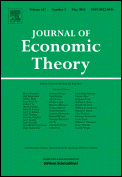
JOURNAL OF ECONOMIC THEORY
Scope & Guideline
Shaping Tomorrow’s Economic Theories Today
Introduction
Aims and Scopes
- Economic Theory Development:
The journal aims to advance economic theory through the development of new models, frameworks, and methodologies that address complex economic issues. - Game Theory and Strategic Interaction:
A significant focus is placed on game-theoretic approaches to understand strategic interactions among agents in various economic contexts, including oligopolies and duopolies. - General Equilibrium Analysis:
The journal explores general equilibrium models that analyze the interdependencies within economies, particularly how various markets interact and influence each other. - Environmental Economics:
Research on the intersection of economics and environmental issues is a core area, addressing topics like pollution control, corporate social responsibility, and sustainable practices. - Labor Economics and Wage Dynamics:
There is a consistent emphasis on labor market dynamics, including wage inequality, employment volatility, and the effects of policy on labor markets. - Trade Theory and International Economics:
The journal publishes research on trade theory, including the implications of outsourcing, tariffs, and international agreements, examining their effects on welfare and market structures.
Trending and Emerging
- Behavioral Economics and Choice Theory:
There is a growing interest in incorporating behavioral elements into economic models, examining how psychological factors influence decision-making and market outcomes. - Technological Change and Innovation Economics:
Research analyzing the impact of technological advancements on economic growth, market structures, and labor dynamics is gaining traction, highlighting the importance of innovation. - Sustainability and Environmental Policies:
Emerging themes around sustainability, especially in relation to corporate responsibility and environmental regulations, reflect an increasing awareness of ecological impacts in economic theory. - Network Theory and Economic Interactions:
The exploration of network effects and their implications for economic behavior is on the rise, particularly in relation to digital platforms and social networks. - Dynamic Models of Trade and Globalization:
There is a notable trend towards using dynamic models to analyze trade and globalization, focusing on the evolving nature of international economic interactions and their long-term effects.
Declining or Waning
- Traditional Welfare Economics:
Research focusing on classical welfare economics principles appears to be waning, possibly overshadowed by more complex interactions in modern economic scenarios. - Static Models of Market Behavior:
There has been a noticeable decline in the publication of static models, with a shift towards dynamic and evolutionary models that capture the complexities of real-world economic behavior. - Purely Theoretical Constructs without Empirical Relevance:
The journal seems to be moving away from purely theoretical constructs that lack empirical validation, favoring research with practical implications or data-driven insights.
Similar Journals

REVUE ECONOMIQUE
Illuminating Economic Discourse Since 1974REVUE ECONOMIQUE, published by PRESSES FOND NAT SCI POLIT in France, is a distinguished academic journal with an ISSN of 0035-2764 and an E-ISSN of 1950-6694. Established in 1974, the journal has evolved significantly over the years, focusing on a diverse range of topics within the field of economics, econometrics, and finance. With its commitment to presenting in-depth research and innovative perspectives, REVUE ECONOMIQUE serves as a vital resource for scholars, professionals, and students seeking to enhance their understanding of economic theories and practices. Although it is currently categorized in the Q4 quartile, ranking 241 out of 288 in the field, the journal aims to foster new dialogues and disseminate valuable insights that contribute to the economic discourse. The journal is not available as open access, but its rich repository of articles continues to attract readers interested in the complexities of economic dynamics. For more information, you can refer to their address at 27 RUE SAINT-GUILLAUME, 75341 PARIS 07, FRANCE.
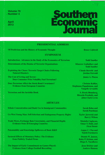
SOUTHERN ECONOMIC JOURNAL
Illuminating Contemporary Issues in Economics.SOUTHERN ECONOMIC JOURNAL, published by Wiley, serves as a premier platform for scholarly research in the fields of economics and econometrics. With an impressive track record spanning from 1976 to 2024, this journal is esteemed for its contributions to economic theory, empirical research, and policy discussions, making it a critical resource for researchers, professionals, and students alike. Holding a commendable Q2 ranking in its category for 2023, it highlights its influence and standing in the field, ranking #291 out of 716 in Scopus within Economics and Econometrics, placing it in the 59th percentile. While it operates on a subscription model, the journal ensures broad accessibility to its content, fostering academic collaboration and knowledge dissemination. For those striving for a deeper understanding of contemporary economic issues, the SOUTHERN ECONOMIC JOURNAL is a vital resource that enriches the discourse in the economic community.
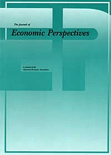
JOURNAL OF ECONOMIC PERSPECTIVES
Bridging Theory and Practice in Economics and EconometricsJOURNAL OF ECONOMIC PERSPECTIVES, published by the American Economic Association, is a leading academic journal that serves as a vital resource for researchers, professionals, and students in the fields of economics and econometrics. With an impressive impact factor, it ranks in the top Q1 quartile according to the 2023 statistics, demonstrating its significant influence and contribution to the discipline, particularly with a notable Scopus Rank of #21 out of 716 in the category of Economics and Econometrics. Spanning from 1992 to 2024, the journal provides a platform for rigorous and comprehensive analyses that illuminate contemporary economic issues and perspectives. While it does not currently offer open access options, its thorough and insightful content ensures it remains a respected and essential part of economic literature, addressing a diverse array of topics that resonate with the academic community.

ECONOMETRICA
Unveiling the complexities of economic theory.ECONOMETRICA, published by Wiley, is a leading journal in the field of economics and econometrics, renowned for its rigorous and cutting-edge research contributions. With an ISSN of 0012-9682 and an E-ISSN of 1468-0262, this esteemed journal holds a prestigious position in the academic landscape, classified in the top quartile (Q1) for both Economics and Econometrics as of 2023, and ranked 42 out of 716 in its field, placing it in the 94th percentile according to Scopus metrics. The journal's scope encompasses a diverse range of topics aimed at advancing economic theory and its practical applications, making it an essential resource for scholars, practitioners, and students alike. Although it operates under a subscription model, the depth and quality of research published in ECONOMETRICA underscore its significance as a cornerstone for intellectual discourse and innovation within the field. Based in the United Kingdom, at 111 River St, Hoboken, NJ 07030-5774, ECONOMETRICA continues to attract high-caliber contributions that shape the future of econometric research.
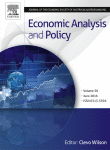
Economic Analysis and Policy
Leading the Way in Economic Insights and Policy DevelopmentEconomic Analysis and Policy is an esteemed academic journal published by ELSEVIER, dedicated to advancing the field of economics and econometrics since its inception in 1970. Based in the Netherlands, this journal plays a pivotal role in disseminating high-quality research that addresses contemporary economic issues and policy challenges. With an impressive Q1 ranking in both the Economics and Econometrics categories, and recognition in the top 91st percentile of Scopus rankings, it is a leading platform for scholars, professionals, and students seeking to contribute to and engage with the evolution of economic thought. The journal does not currently operate on an open access model, allowing it to maintain rigorous peer-review standards that ensure the integrity and impact of published research. As a vital resource for anyone interested in the intersection of theory and policy in economics, Economic Analysis and Policy fosters a community committed to rigorous analysis and innovative solutions in the economic domain.
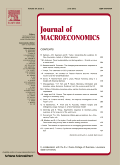
JOURNAL OF MACROECONOMICS
Pioneering Scholarly Discourse in EconomicsJOURNAL OF MACROECONOMICS, published by Elsevier, stands as a significant platform for scholarly discourse in the field of economics and econometrics. With an ISSN of 0164-0704 and an E-ISSN of 1873-152X, this journal has been actively contributing to the academic community since 1979 and continues to publish impactful research through 2024. It is recognized within the Q2 category for Economics and Econometrics in its 2023 quartile rankings, and it holds a respectable Scopus ranking of #353 out of 716 in its field, placing it in the 50th percentile. Despite not being an open-access journal, it provides valuable insights into macroeconomic theories, empirical assessments, and policy implications, making it an essential resource for researchers, professionals, and students aiming to deepen their understanding of macroeconomic dynamics. To access a breadth of contemporary research and enhance your academic pursuits, consider diving into the latest issues of this esteemed journal, conveniently located in Amsterdam, Netherlands, at RADARWEG 29, 1043 NX.
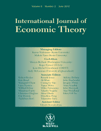
International Journal of Economic Theory
Connecting scholars to elevate economic discourse.International Journal of Economic Theory, published by Wiley, serves as a vital platform for scholars and researchers in the fields of economics and econometrics. With its ISSN 1742-7355 and E-ISSN 1742-7363, this journal focuses on advancing theoretical understandings in economics, providing a comprehensive analysis of contemporary economic issues. The journal has been converging knowledge and innovation since its inception in 2009 and continues to sustain a commitment to high-quality research until 2024. As a Q3 journal in the 2023 category rankings, it ranks in the 21st percentile in Scopus for Economics and Econometrics, reflecting its established presence amidst competitive scholarly discourse. Although it is not open access, the journal is widely accessible through institutional subscriptions, facilitating learning and research for professionals, graduate students, and academic leaders. The International Journal of Economic Theory is pivotal for those looking to contribute to economic thought, ensuring that emerging theories find a respected outlet in the global academic landscape.

CAMBRIDGE JOURNAL OF ECONOMICS
Fostering Knowledge in Economics and EconometricsCambridge Journal of Economics, published by Oxford University Press, is a premier academic journal in the field of economic theory, policy, and applications, catering to researchers, professionals, and students alike. With a rich history dating back to 1977, this journal has established itself as a notable contributor to critical discourse in the arena of Economics and Econometrics. With an impressive Scopus ranking of #210 out of 716 in its category, placing it in the 70th percentile, the journal maintains a solid Q2 classification, reflecting its significant impact and contribution to the field. Although it operates on a subscription basis, the Cambridge Journal of Economics is accessible through a range of academic databases and libraries, ensuring that its high-quality research reaches a wide audience. The journal aims to advance the understanding and application of economic principles, making it an essential resource for anyone looking to deepen their knowledge or stay updated with the latest research trends in economics.
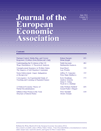
Journal of the European Economic Association
Fostering Innovative Research for a Global EconomyThe Journal of the European Economic Association, published by Oxford University Press, stands as a cornerstone in the field of economics, boasting a strong impact factor that reflects its high citation rates and significance among peers. With an impressive Scopus ranking of 12 out of 288 in general economics, encompassing a remarkable 96th percentile, this journal is recognized for its rigorous peer-reviewed research contributions that advance the understanding of economic theory and policy. Dedicated to publishing innovative studies and theoretical advancements since its inception in 2003, it continues to engage scholars worldwide, providing vital insights applicable to both academia and industry. Although it does not follow an open-access model, the journal's extensive reach and commitment to excellence make it an essential resource for researchers, professionals, and students seeking to deepen their understanding of contemporary economic issues. Based in the United States, the journal reflects a European perspective on global economic challenges, making it indispensable for those at the forefront of economic research.
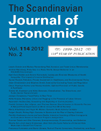
SCANDINAVIAN JOURNAL OF ECONOMICS
Unveiling the Dynamics of Economic ResearchSCANDINAVIAN JOURNAL OF ECONOMICS (ISSN: 0347-0520, E-ISSN: 1467-9442), published by Wiley, stands as a pivotal platform for disseminating research in the fields of economics and econometrics. With an impressive Q1 ranking in both disciplines, this journal plays a critical role in advancing theoretical and applied economic research, catering to an international audience of scholars, practitioners, and students. Its coverage from 1977 to 2024 demonstrates a robust commitment to publishing high-quality research that influences both policy-making and academic inquiry. Although it operates on a traditional subscription model, the journal remains accessible to a broad readership, which is essential for fostering knowledge sharing within the economics community. As such, the SCANDINAVIAN JOURNAL OF ECONOMICS is an essential resource for those seeking to explore the latest developments and methodologies in economic research, helping to bridge practical insights with academic rigor.